|
|
|
Sort Order |
|
|
|
Items / Page
|
|
|
|
|
|
|
| Srl | Item |
| 1 |
ID:
099937
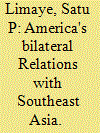

|
|
|
|
|
| Publication |
2010.
|
| Summary/Abstract |
This special issue of Contemporary Southeast Asia examining United States bilateral relations with Myanmar, Cambodia, Indonesia, Laos and Vietnam, and specifically the mutual efforts at "rapprochement", "re-engagement" or "revitalization", is informed by several considerations. First, the Obama administration took office with a declared commitment to improve relations with the Association of Southeast Asian Nations (ASEAN) as an organization and moved with alacrity to implement a number of policy decisions to that end. Second, and in parallel, the administration highlighted opportunities for broader and deeper bilateral relations with specific ASEAN member countries…Together, this focus on Southeast Asia is an important element of the current administration's overall focus on US relations with the Asia Pacific - a focus which represents one of the most significant periods of US regional activism in decades.
|
|
|
|
|
|
|
|
|
|
|
|
|
|
|
|
| 2 |
ID:
124716
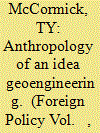

|
|
|
|
|
| Publication |
2013.
|
| Summary/Abstract |
The article provides various historical anecdotes regarding efforts to engineer weather and climate. It includes the 1841 theories of American meteorologist James Pollard Espy to promote rain by igniting massive fires, the 1896 findings by Swedish chemist Svante Arrhenius that found a direct correlation between a rise in carbon dioxide levels and rising temperatures across the globe, and the 1967-1972 Operation Popeye which used cloud seeding as a U.S. military tactic during the Vietnam War and its associated military operations in Cambodia and Laos.
|
|
|
|
|
|
|
|
|
|
|
|
|
|
|
|
| 3 |
ID:
179629


|
|
|
|
|
| Summary/Abstract |
World trade has been the engine of global growth and demand for free and fair global trade free from protectionist measures is still the most accepted desirable norms. We are living in a multipolar global economic order today where global economic major powers have started accepting the role and potential of regional manufacturing hubs. America , China , Italy , Germany , united kingdom , Russia have been governing the global economy for a long time and even maintained their hegemony in global supply chain. But now the multiple trade wars among several global powers have given opportunities to regional manufacturing hubs across the globe to flourish.
|
|
|
|
|
|
|
|
|
|
|
|
|
|
|
|
| 4 |
ID:
108968
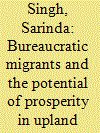

|
|
|
|
|
| Publication |
2011.
|
| Summary/Abstract |
This paper argues that Lao bureaucrats who migrate to the uplands offer possibilities for re-thinking the immutability of upland-lowland distinctions and the power of the modern state. The specific focus is on low-ranking government officials on the Nakai Plateau in central Laos who are positioned at the nexus of state authority, development schemes and the rural poor. Nakai is a site of nationally significant resource utilisation and practices that has provided a model for development across the country. Officials' experiences in Nakai suggest that the upland-lowland contrast can provide valuable understandings of power when combined with an awareness of social processes that reproduce and shift the meanings ascribed to these nominally distinct domains. Significantly, the experiences of mobile marginal officials highlight an idea of state power as the potential to grant prosperity.
|
|
|
|
|
|
|
|
|
|
|
|
|
|
|
|
| 5 |
ID:
132801


|
|
|
|
|
| Publication |
2014.
|
| Summary/Abstract |
Burma was inhabited by migration of Mongol people from China thousands of years ago as part of a migration that also settled Mongol people in Assam, the hills and valleys of Northeast India, Bhutan, Sikkim, Nepal, and Tibet. Another wave migrated and populated South East Asia-Malaya, Vietnam, Laos, Cambodia, Indonesia and the Philippines. In Burma, a majority settled in the Central plains, while others 'settled on the hill ranges that extended north-south on either side of the Central plains. All these different groups had evolved animist religions. In India to the West, two major religions evolved, besides numerous animist religions too. The two major religions were Hinduism and Buddhism. It was the Buddhist king Ashoka who propagated Buddhism to several countries to the West and East of his country. To the East, the emissaries of Ashoka carried Buddhism to Burma and several South East Asian countries, Vietnam, Cambodia, Laos, Sri Lanka, Tibet, China and Japan.
|
|
|
|
|
|
|
|
|
|
|
|
|
|
|
|
| 6 |
ID:
076274


|
|
|
|
|
| Publication |
2006.
|
| Summary/Abstract |
This article examines the political dimension of historiography in contributing to the Lao nation-state building project, with particular reference to institutional and social forms of Lao political culture, the role of minority groups during the Revolution and the lingering shadow of the country's aristocratic past. Reference is made to several key issues in current Lao historiography. The article also raises the issue of the respective political responsibilities of Lao and foreign historians in helping to construct a national history.
|
|
|
|
|
|
|
|
|
|
|
|
|
|
|
|
| 7 |
ID:
097886
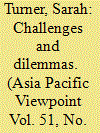

|
|
|
|
|
| Publication |
2010.
|
| Summary/Abstract |
The Chinese, Vietnamese and Lao spaces within the upland Southeast Asian massif, sheltering over 80 million people belonging to geographically dispersed and politically fragmented minority populations, have only recently reopened to overseas academic endeavours. Undertaking social sciences research there among ethnic minority groups is underscored by a specific set of challenges, dilemmas, and negotiations. This special issue brings together Western academics and post-fieldwork doctoral students from the realms of social anthropology and human geography, who have conducted in-depth fieldwork among ethnic minorities in upland southwest China, northern Vietnam, and southern Laos. The articles provide insights into the struggles and constraints they faced in the field, set against an understanding of the historical context of field research in these locales. In this unique context that nowadays interweaves economic liberalisation with centralised and authoritarian political structures, the authors explore how they have negotiated and manoeuvred access to ethnic minority voices in complex cultural configurations. The ethical challenges raised and methodological reflections offered will be insightful for others conducting fieldwork in the socialist margins of the Southeast Asian massif and beyond. This specific context is introduced here, followed by a critique of the literature on the core themes that contributors raise.
|
|
|
|
|
|
|
|
|
|
|
|
|
|
|
|
| 8 |
ID:
106701
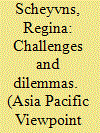

|
|
|
|
|
| Publication |
2011.
|
| Summary/Abstract |
The Chinese, Vietnamese and Lao spaces within the upland Southeast Asian massif, sheltering over 80 million people belonging to geographically dispersed and politically fragmented minority populations, have only recently reopened to overseas academic endeavours. Undertaking social sciences research there among ethnic minority groups is underscored by a specific set of challenges, dilemmas, and negotiations. This special issue brings together Western academics and post-fieldwork doctoral students from the realms of social anthropology and human geography, who have conducted in-depth fieldwork among ethnic minorities in upland southwest China, northern Vietnam, and southern Laos. The articles provide insights into the struggles and constraints they faced in the field, set against an understanding of the historical context of field research in these locales. In this unique context that nowadays interweaves economic liberalisation with centralised and authoritarian political structures, the authors explore how they have negotiated and manoeuvred access to ethnic minority voices in complex cultural configurations. The ethical challenges raised and methodological reflections offered will be insightful for others conducting fieldwork in the socialist margins of the Southeast Asian massif and beyond. This specific context is introduced here, followed by a critique of the literature on the core themes that contributors raise.
|
|
|
|
|
|
|
|
|
|
|
|
|
|
|
|
| 9 |
ID:
157220
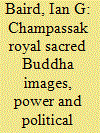

|
|
|
|
|
| Summary/Abstract |
What is the relationship between Buddha images and the legitimization of political power over space? What understandings exist amongst royals concerning regaining spatial power associated with Buddha images? This article considers these questions with a particular focus on the Champassak Royal House, a royal family that was originally spatially constituted through the territorial control it had over present-day southern Laos and some neighbouring areas. To do this, the article draws upon two case studies, one centred on an important Buddha image in the 18th century, the other more contemporary and linked to Buddha images and exiled members of the Champassak Royal House. Buddha images have long played an important role in constituting and defining sacred geographies, and thus political power, in Champassak, as has similarly been the case in other parts of mainland Southeast Asia.
|
|
|
|
|
|
|
|
|
|
|
|
|
|
|
|
| 10 |
ID:
073563
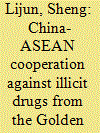

|
|
|
|
|
| Publication |
2006.
|
| Summary/Abstract |
This article studies the cooperation mechanisms between China and ASEAN (the Association of Southeast Asian Nations) to control drug trafficking in the Golden Triangle. Cooperation currently falls into three categories: under the framework of ASEAN+1 (China) and ASEAN+3 (China, Japan, and South Korea); under the framework of Greater Mekong Sub-Region (GMS) cooperation; and between the local governments of China and Myanmar, Laos, and Vietnam. The article explores deficiencies in this cooperation and ways it can be improved.
|
|
|
|
|
|
|
|
|
|
|
|
|
|
|
|
| 11 |
ID:
097853
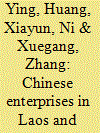

|
|
|
| 12 |
ID:
100307
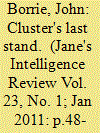

|
|
|
| 13 |
ID:
097891
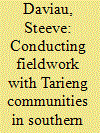

|
|
|
|
|
| Publication |
2010.
|
| Summary/Abstract |
Based on research with ethnic minorities in Laos aimed at understanding how they cope with and negotiate political and economic 'double domination', this article examines the experiences of prolonged fieldwork in a remote Tarieng area in the Annam Range, southern Laos. After briefly reviewing Lao ethnographical policy and practice regarding ethnic minorities, I introduce the Tarieng people. I detail how I initially gained access to these local communities via long-term engagement with a range of development project initiatives. Then, after eight years of conducting such fieldwork in a Tarieng area 'below the radar of the state', I managed to obtain official authorisations to continue research as a graduate student. In this new position, I accessed the field via different negotiations with central, provincial and local official bureaucracies. After detailing this process, back in the field I reveal my strategies to create a discursive space that has allowed me to access dissident Tarieng voices and agency. Finally, I highlight four central elements that have continued to shape my field research: language proficiency, working with research assistants, awareness of political relations and cultural sensitivity, and ethical concerns. These have emerged while the possibilities and constraints of political engagement with the Tarieng people are explored.
|
|
|
|
|
|
|
|
|
|
|
|
|
|
|
|
| 14 |
ID:
151474
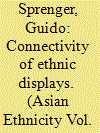

|
|
|
|
|
| Summary/Abstract |
In Laos, cultural festivals and other forms of ethnic display communicate locality and ethnicity to external agencies, in particular the nation state. This article documents strategies of identity-making in a small festival that was staged spontaneously in a Rmeet (Lamet) village. The chosen representations were conventional: dance, music, clothing. The Rmeet thereby employed a festival code used by numerous minorities worldwide. But these recently invented traditions are continuous with earlier representations that addressed various categories of strangers, including historic states and non-state groups. What has changed is the connectivity of the representations. Dance or costume used to represent external relationships in the past, but have been recoded for present use. Moreover, Rmeet have appropriated a New Year’s festival invented by the neighboring Khmu. Thus, ethnic displays appear as the most recent way of communicating difference in a code that connects them with the state, neighboring ethnicities, and a global language of locality.
|
|
|
|
|
|
|
|
|
|
|
|
|
|
|
|
| 15 |
ID:
052462
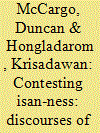

|
|
|
|
|
| Publication |
June 2004.
|
| Summary/Abstract |
This paper discusses the idea of Isan (Northeastern Thai) ethnoregional identity, and its relationship with two major alternative ideas: Thai identity and Lao identity. Drawing on ethnolinguistic research, the paper argues that Isan identity is a problematic political construct, reflecting ambiguous self-understandings and self-representations on the part of Northeasterners. Northeasterners are engaged in a negotiation process about their relationships with Thai and Lao identities, relationships fraught with cultural, social and political ramifications. The study suggests a more nuanced appreciation of the ambiguities of Isan identity than has yet been proposed.
|
|
|
|
|
|
|
|
|
|
|
|
|
|
|
|
| 16 |
ID:
141898
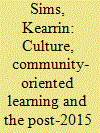

|
|
|
|
|
| Summary/Abstract |
This article critically interrogates current policy-sector approaches to culturally sensitive development and the manner in which culture has been conceptualised within the post-2015 development agenda-setting process. By providing a brief interpretive summary of academic debates surrounding culture and development, an analysis of how ‘culturally sensitive’ practices have been pursued within the policy sector, and an examination of the insufficient consideration given to culturally sensitive development within post-2015 agenda setting, I argue that much uncertainty remains around how to translate complex academic understandings of culture and development into policy responses. Following this, I provide one case study drawn from the small, low-income country of Laos to suggest possibilities as to how culturally sensitive development may be better conceptualised and implemented within a post-2015 global development era.
|
|
|
|
|
|
|
|
|
|
|
|
|
|
|
|
| 17 |
ID:
192851
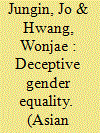

|
|
|
|
|
| Summary/Abstract |
Despite achievements in women’s economic and political empowerment, gender inequalities persist in the key socioeconomic areas of health and education in Laos. How can we explain these gaps in equality? We analyze how Lao people perceive gender equality and how differences in the perception of multiple dimensions of gender equality affect women’s rights in healthcare and education. The results of a 2023 survey of 664 Laotians highlight the perception of equal responsibilities as the key dimension of gender equality, which may limit the improvement of gender equality in health. The results imply that female leadership and greater public consideration of gender equality with respect to rights and opportunities may promote gender equality in Laos. This study contributes to the study of perceptions and practices of gender equality in non-Western countries.
|
|
|
|
|
|
|
|
|
|
|
|
|
|
|
|
| 18 |
ID:
095562
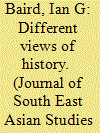

|
|
|
|
|
| Publication |
2010.
|
| Summary/Abstract |
The administrative boundary between Laos and Cambodia is amongst the least studied international borders in Southeast Asia. Since Laos and Cambodia became independent in 1953-54, relatively minor but sustained tensions have characterised border relations. An important reason for disagreements is irredentist feelings. Some ethnic Lao in both Laos and Cambodia believe that part of northeastern Cambodia should be added to Laos, while some ethnic Khmer in Cambodia insist that their border should be extended to include part of southern Laos. Different emphases and framings of history have contributed to irredentism and the development of identities in relation to the border.
|
|
|
|
|
|
|
|
|
|
|
|
|
|
|
|
| 19 |
ID:
076277
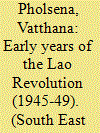

|
|
|
| 20 |
ID:
106695
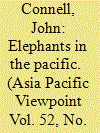

|
|
|
|
|
| Publication |
2011.
|
| Summary/Abstract |
The Chinese, Vietnamese and Lao spaces within the upland Southeast Asian massif, sheltering over 80 million people belonging to geographically dispersed and politically fragmented minority populations, have only recently reopened to overseas academic endeavours. Undertaking social sciences research there among ethnic minority groups is underscored by a specific set of challenges, dilemmas, and negotiations. This special issue brings together Western academics and post-fieldwork doctoral students from the realms of social anthropology and human geography, who have conducted in-depth fieldwork among ethnic minorities in upland southwest China, northern Vietnam, and southern Laos. The articles provide insights into the struggles and constraints they faced in the field, set against an understanding of the historical context of field research in these locales. In this unique context that nowadays interweaves economic liberalisation with centralised and authoritarian political structures, the authors explore how they have negotiated and manoeuvred access to ethnic minority voices in complex cultural configurations. The ethical challenges raised and methodological reflections offered will be insightful for others conducting fieldwork in the socialist margins of the Southeast Asian massif and beyond. This specific context is introduced here, followed by a critique of the literature on the core themes that contributors raise.
|
|
|
|
|
|
|
|
|
|
|
|
|
|
|
|
|
|
|
|
|